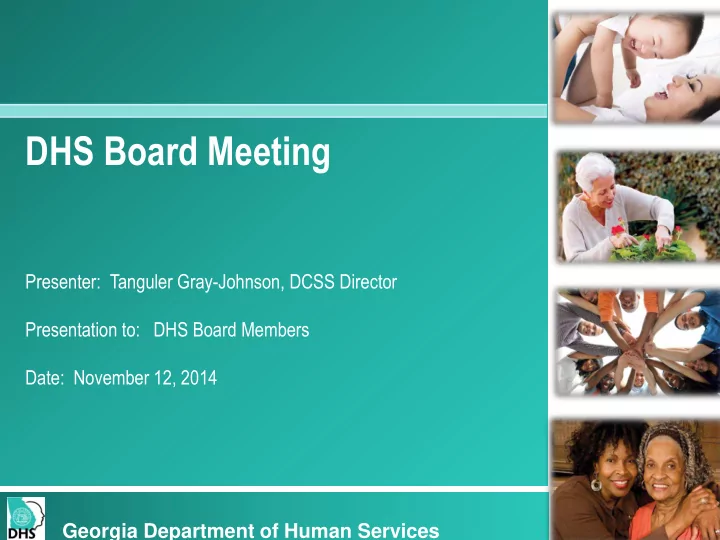

DHS Board Meeting Presenter: Tanguler Gray-Johnson, DCSS Director Presentation to: DHS Board Members Date: November 12, 2014 Georgia Department of Human Services
Vision, Mission and Core Values Vision Stronger Families for a Stronger Georgia. Mission Strengthen Georgia by providing Individuals and Families access to services that promote self-sufficiency, independence, and protect Georgia's vulnerable children and adults. Core Values • Provide access to resources that offer support and empower Georgians and their families. • Deliver services professionally and treat all clients with dignity and respect. Manage business operations effectively and efficiently by aligning resources across the agency. • Promote accountability, transparency and quality in all services we deliver and programs we administer. • Develop our employees at all levels of the agency.
DCSS Workflow Intake Locate Applications Paternity Walk-ins Automated Interfaces and Establishment Mail Manual Searches are On-line Portal DNA Paternity Test performed to locate Non- IV-A Referrals Custodial Parents Foster Care Referrals Court Order Establishment Financial Financial Support, Medical Support Centralized Payment Processing by Process service (Sherriff or private process the Family Support Registry (FSR) server) Enforcement Administrative and Judicial Actions are taken to collect delinquent payments (drivers license suspension, passport denial, tax intercept, lottery winning intercept) etc. Outreach Programs Review & Modification DCSS has partnered with other government and community Administrative and/or Judicial Review of court orders that are 36 months old or older for possible agencies to develop a comprehensive network of services. modification of support amount. Georgia Department of Human Services
DCSS Offices and Performance • FFY 13 Performance – Collections - $695M – Caseload count – 388,649 – Georgia children - 521,000 • FFY 14 Performance – Collections – $704 M – Caseload count – 396,640 – Georgia children - 533,252 • Outreach Programs – Fatherhood – 2,092 – 18 Problem Solving Courts -statewide • Non Custodial Parents 1,091 • Children 1600 • Support collected $837,879.65 • Incarceration savings $4.9M • Graduates 103
Behavioral Intervention CS Services Grant – BICS • Background information – BICS grant overview – behavioral economics – OCSE – BICS Project Officer and Evaluation BICS Project Officer – Technical Assistance - MDRC, MEF Associates and Center for Policy Research – Evaluation of BICS grant – Washington State, Project Manager and Grants Manager – Grantee administrative Information – key staff, timeline, meetings and budget staff – Kick off webinar – October 22 nd • 8 BICS Grantees – Sacramento and San Joaquin counties - California – Denver, Garfield, Pitkin and Rio Blanco Counties - Colorado – Office of Attorney General for District of Columbia CS Division – Fulton, Dekalb, Crawford, Peach, and Bibb Counties – Georgia – Franklin and Cuyahoga Counties – Ohio – San Antonio, Dallas, El Paso, Abilene and Paris - Texas Office of Attorney General – King, Thurston and Whatcom Counties - Washington State – Vermont Agency of Human Services
Behavioral Economics • Behavioral Economics Defined…….. • Multi – county approach – “Study of psychological, social, cognitive and – Fulton county, Jessica Cannon – Site Manager emotional factors on the economic decisions of – Macon – Bibb county, Ryan Bradley, Site Manager individuals and institutions and the consequences – Dekalb county, recruitment pending for market prices, returns and resource allocation ” – Project Director, recruitment pending – Advances self sufficiency, parent accountability • 5 year project period • Traditional view (neoclassical economics) – Year 1-2 planning, data gathering & process mapping – Well informed – Years 2-4 implementation & program analysis – Stable preferences – Year 5 evaluation, reporting, successes & grant close – No problems with self control – Completely self interested • Collaboration with OCSE and TAE Team – Good decision making that maximizes well being – Technical Assistance - define, diagnose, design and test – Evaluation team- Washington State • Behavioral view (behavioral economics ) – Grantee calls, meetings (Washington, DC) and site visits – Limited cognition – Rapid Cycle Evaluation – Imperfect self control – Building capacity in behavioral economics – Shifting preferences – Procrastination • Grant Award (66% Federal financial participation rate) – Mental shortcuts – $150,000 for 2014-2015 – Small factors can influence big decisions – $30,000 for 2016-2018
Recommend
More recommend